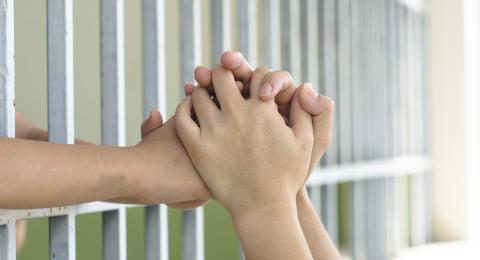
1,000,000 Women, Mostly Mothers, Are Behind Bars Or On Parole In The United States
1,000,000 women, mostly mothers are behind bars or under criminal justice supervision in the United States. Two-thirds of the women in federal prisons are serving time for challenges related to nonviolent drug abuse. They need treatment and counseling, not incarceration.
Our justice system is failing families, hurting our economy and in need of some serious reforms. We have the highest incarceration rate in the world, which is nothing to brag about. In fact, we are living in a time when more than 2.7 million children in the U.S. have an incarcerated parent and approximately 10 million children have experienced parental incarceration at some point in their lives. Harsh sentencing practices have done more harm than good. Strict penalties designed to combat the distribution of illegal drugs have done little to stem the drug trade; instead the result has been a massive sweeping of people experiencing challenges related to drug addiction into an ever-expanding criminal justice system that directly fractures families and hurts our economies.
Join us in asking Congress to reform sentencing and restore families this year! CLICK HERE TO SIGN.
Overall, the United States has the largest prison population and the highest incarceration rate in the entire world. Children and families lose the most in this trend with more than 2.7 million children in the U.S. having an incarcerated parent. That is 1 in 28 children. Women are the fastest growing segment of the incarcerated population.
Furthermore, mandatory minimums have been used against people from communities of color at a staggeringly disproportionate rate: Over the past several years, the U.S. Sentencing Commission has reported that about seventy percent of mandatory minimums are imposed on African American and Latino individuals.
The Sentencing Reform and Corrections Act is one step in the right direction and will enact much needed changes to our justice system. By reducing lengthy prison sentences for certain nonviolent drug offenses and providing those currently incarcerated with the opportunity to petition the court for a reduction in their sentence.
We know that no ONE piece of legislation can solve all of the problems, but the Sentencing Reform and Corrections Act has some positive measures. The bill includes reforming the “three strikes” penalty that mandated life sentences for certain individuals by reducing it to a term of 25 years. A similar provision that mandated 20-year sentences for certain individuals has been reduced to 15. Judges are given more discretion to sentence below prescribed mandatory minimums by the expansion of the existing “safety valve” and the creation of a new authority for judges to depart from certain mandatory minimums. These measures work toward ensuring that strict mandatory minimums are not imposed on individuals who have little or no criminal history and whose alleged conduct was not the sort envisioned by these strict penalties.
However, we are concerned about some provisions in the bill that would add new mandatory minimum sentences for certain crimes. Our country would be better served not by including this provision, but by making investments to strengthen community health and prevent crime.
There is a lot of good in this bill and your voice is needed to help move it forward! Not only are many mandatory minimums reduced, there are excellent provisions in this bill that provide for the expansion of pre-release and reentry programming. These programs will assist incarcerated persons as they prepare for life after release and will help lower the chances that they will reoffend.
America should be a nation of second chances. With this bill, individuals who had no hope of ever leaving prison will be given release dates and can look forward to returning home to their families and contributing to their communities. Provisions of this bill also provide for the expansion of pre-release and reentry programming. These programs will assist incarcerated persons as they prepare for life after release and will help lower the chances that they will reoffend.
The Sentencing Reform and Corrections Act is a much needed first step to creating a fairer criminal justice system, but we have a long way to go! Join us for the long haul by making it a launching pad for other necessary reforms in the future.



The views and opinions expressed in this post are those of the author(s) and do not necessarily reflect those of MomsRising.org.
MomsRising.org strongly encourages our readers to post comments in response to blog posts. We value diversity of opinions and perspectives. Our goals for this space are to be educational, thought-provoking, and respectful. So we actively moderate comments and we reserve the right to edit or remove comments that undermine these goals. Thanks!